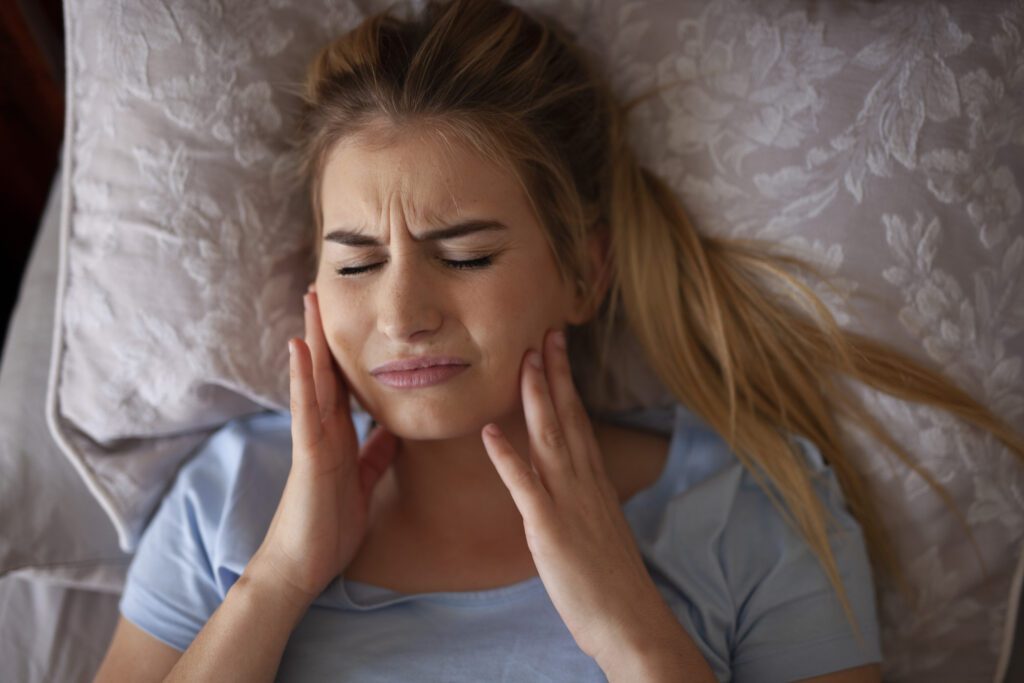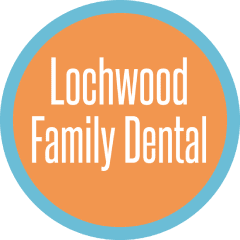If you wake up with headaches or jaw pain, you may have TMD. Also known as TMJ, TMD is a disorder that occurs when you have stress or an injury to the temporomandibular joints. TMJ disorders create pain in the jaw, forehead, and upper body. At Lochwood Family Dental, we offer TMJ treatment in Dallas, TX, as a part of our restorative dentistry services.
Our dentist will work with you to restore comfort and function to your teeth and jaw with TMJ treatment. Living with TMD, especially over time, can create chronic pain and issues with eating. We want to restore comfort to your teeth, jaw, and other parts of the body with TMJ therapy.

What is TMJ?
TMJ stands for temporomandibular joint. This is the joint that connects your lower jaw (mandible) to your skull. You have one TMJ on each side of your head, just in front of your ears. These joints are what allow you to move your jaw up and down, side to side, and forward and backward. They help you talk, chew, and yawn.
Sometimes, the TMJ can have problems, leading to a condition called TMD (temporomandibular disorder). When you have TMD, it means that your TMJ or the muscles around it are causing you pain or discomfort.
What Causes TMJ Disorders?
Several factors can contribute to TMJ problems:
- Teeth Grinding and Clenching: Many people grind their teeth or clench their jaw, often without realizing it, especially during sleep. This puts extra pressure on your TMJ and can lead to pain and damage over time.
- Jaw Injury: If you’ve had an injury to your jaw or face, it can affect the TMJ and lead to problems. Even minor injuries can sometimes cause issues if not properly treated. Imbalance in the jaw can lead to teeth grinding and headaches.
- Stress: Stress can make you tense up your jaw muscles. This constant tension can lead to TMJ pain and other symptoms. Often, stress manifests in the upper body, which affects the muscles and joints.
- Misaligned Bite: If your teeth don’t fit together properly (a condition known as a misaligned bite), it can put extra strain on your TMJ. This can be due to crooked teeth, an overbite, or other alignment issues. Sometimes, treating bite problems can relieve TMJ pain.
- Arthritis: Conditions like osteoarthritis or rheumatoid arthritis can also affect the TMJ. These conditions can make the TMJ painful and stiff. It can make everyday things like biting, chewing, yawning, or talking uncomfortable.
Signs of TMJ
You should recognize the signs of TMJ to get the right treatment. Look out for these symptoms:
- Teeth clenching and grinding (bruxism)
- Chronic headaches and migraines
- Difficulty moving your jaw
- Pain when you eat hard foods
- Toothaches
If you notice any of these symptoms, please contact our office to make an appointment. We will thoroughly examine your teeth, bite, and jaw with a visual exam and digital X-rays. This thorough examination will help us find the right treatment to meet your needs.
TMJ Treatment in Dallas, TX
Multiple treatments are effective to help you manage your TMJ symptoms in and outside our dental office:
Nightguards
One common treatment for TMJ is using a nightguard. If you grind your teeth at night, a nightguard can help protect your teeth and reduce pressure on your TMJ. This is a custom-made device that fits over your teeth and prevents them from touching each other, which can help to reduce grinding and clenching.
A nightguard is comfortable and designed to fit your mouth perfectly, so you can wear it while you sleep without discomfort. It can also help to prevent damage to your teeth and reduce muscle tension in your jaw.
Bite Equilibration
In some cases, malocclusion or a bad bite can increase strain on the TMJ. This leads to symptoms like headaches, jaw pain, and uneven tooth wear. Creating an even bite can help reduce these symptoms in some patients.
We may recommend treatments like crowns or bonding if you have tooth damage from an injury or teeth clenching and grinding. Crowns are best for larger areas of tooth damage. A dental crown is a cap that fully covers and protects single teeth. If you have smaller chips or areas of wear, we recommend tooth bonding. Bonding adds tooth-colored material to damaged teeth.
Physical Therapy
This is an effective option to help manage your TMJ symptoms. We may recommend specific exercises and stretches to help strengthen and relax your jaw muscles. These exercises can improve jaw movement, reduce pain, and increase flexibility.
Physical therapy might include gentle exercises to help improve jaw movement and reduce stiffness. Stretching and strengthening techniques to help relax and strengthen the muscles around your TMJ. Hands-on techniques like massage can reduce muscle tension and improve jaw function.
Lifestyle Changes
Making some changes to your daily habits can also help manage TMJ symptoms. Here are a few lifestyle adjustments that might make a difference:
- Eat Soft Foods: Try to stick to softer foods that don’t require a lot of chewing. Foods like nuts, chips, and gum can strain your jaw. Avoid these to help your TMJ heal. Instead, eat oatmeal, yogurt, tofu, and softer foods to give your jaw a rest.
- Improve Your Posture: Good posture can help treat TMD. When using your smartphone or laptop, ensure your screen is even with your eye line to reduce strain in your neck and jaw.
- Practice Relaxation Techniques: Stress can contribute to TMJ problems, so finding ways to relax can be helpful. Techniques like deep breathing, meditation, or yoga can help reduce overall stress and tension.
- Use Heat or Ice: Applying a warm compress or ice pack to your jaw can help reduce pain and swelling. A warm compress can also relax muscles, and an ice pack can reduce inflammation. We often recommend a warm compress if you have a TMJ flare-up. Ice is best for when you initially injure your TMJ or jaw.
Treat Jaw Pain Today
Call Lochwood Family Dental for TMJ treatment in Dallas, TX at 214-544-9633. You can also schedule a dental appointment with us online.
